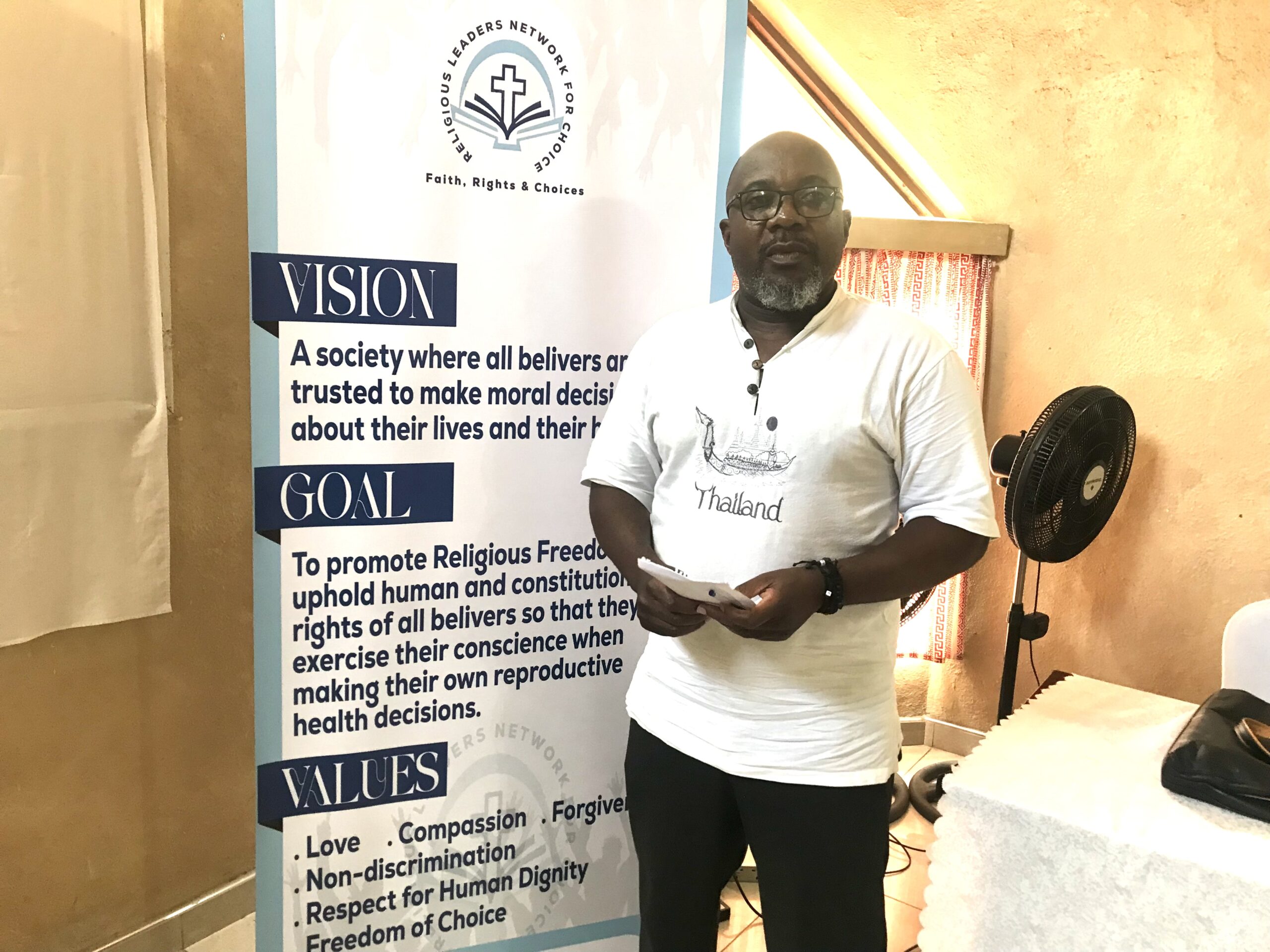
Religious Leaders Network for Choice National Coordinator, Rev Nyekanyeka
* Religious Leaders Network for Choice advocates dignity for all human beings and believes that rape, defilement and sexual abuse are evil and should not be justified
* As the court recognised and confirmed that health is not just an absence of illness but it goes beyond that to include mental health which is also of great concern to society
* By making emphasis on the mental health aspect of the minor, the High Court Judge aligned his ruling to the teachings of faith denominations, which permit abortion if the life of the pregnant woman or girl is in danger
By Duncan Mlanjira
The Religious Leaders Network for Choice, a member of the Sexual and Reproductive Justice Network (SEJUN), has highly praised the Malawi High Court for delivering a land mark ruling, which will set free minors who fall pregnant from sexual violence such as rape and defilement “from the torment of carrying forced pregnancies to term while suffering alone in silence”.

Advertisement
At a press conference yesterday held at Grace Bandawe Conference Centre in Blantyre, the religious body’s National Coordinator, Rev Cliff Nyekanyeka issued a statement calling upon the government “to make sure that the ruling is respected and that necessary measures are put in place to ensure its enforcement”.
“As the Religious Leaders Network for Choice, we pragmatically understand the psychological trauma which sexually abuse women and minors in particular, go through because for quite a long time our members have handled such victims through our working collaboration with health facilities throughout the country, especially through the one-stop centres where such victims are offered help.”
In his ruling on October 28, 2025, High Court Judge, Justice Tembo ordered that girls who have experienced sexual violence, if they wish, are free to seek safe abortions without any obstacles, as in accordance with Section 19 of the Gender Equality Act.
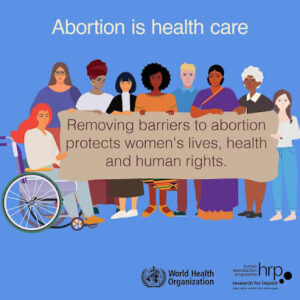
A case was brought before Justice Michael Tembo after a 14-year-old girl — assisted by Nyale Institute of Reproductive Health — filed a lawsuit against a clinician at Chileka Health Centre, Blantyre District Council and the Minister of Health for failing to provide the minor with safe abortion after she was raped.
Justice Tembo observed that this infringed upon the minor’s sexual and reproductive health rights, and he emphasised that “the Court had no doubt in its mind that a purposive interpretation of section 19 of the Gender Equality Act entails that a girl victim of a sexual offence who is pregnant as a result of such an offence definitely has a right to seek an abortion automatically upon indications that she had become pregnant as a result of a sexual offence being perpetrated on her”.
He faulted the Chileka Health Centre clinician that by refusing to offer the service to the minor, he “violated Section 19 of the Gender Equality Act because there was proof enough beyond any reasonable doubt that the minor had become pregnant after being defiled”.
“In his ruling, the esteemed Judge further observed that it is harsh and inhumane to insist that such a girl keep the pregnancy in such circumstances if she has a desire to terminate it.
“It is therefore only logical and in accordance with her sexual and reproductive health rights that such a girl be allowed, without let or hindrance, to demand — if she so wishes upon exercise of her free will — access to abortion services so that her life be preserved from ruin by either mental or physical challenges associated with such an unwanted pregnancy.
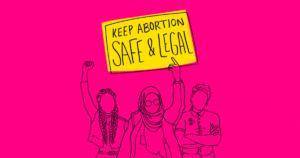
Justice Tembo is strong commended for considering the aspect of mental health and trauma associated with defilement, rape and other sexual abuse as he criticised the clinician’s refusal to provide a safe abortion was solely focused on the physical health of the raped girl — “neglecting her mental health”.
“The clinician only examined the claimant’s physical health relative to the pregnancy but did not record any examination of her mental health to determine associated risks,” says the Religious Leaders Network for Choice.
“We are grateful that the High Court Judge made emphasis on the mental health of the minor as a very critical element which shouldn’t have been left out in the examination by the health service provider to determine the danger threatening the life of the minor.
“We have noticed that most debates on the health of victims of sexual abuse centres on the physical aspect while throwing the mental aspect to the periphery. It is high time as a nation we do a soul-searching and ask ourselves questions on how we perceive mental health challenges and how we would like to address them to ensure that lives are saved from preventable deaths resulting from suicide and other mental health related deaths.
“We are very grateful to note that the court recognised and confirmed that health is not just an absence of illness but it goes beyond that to include mental health which is also of great concern to society.”

Advertisement
Following other religious leaders’ beliefs that strongly condemn abortion, maintaining that ‘thou shall not kill’, the Choice Network takes note that “by making emphasis on the mental health aspect of the minor, the High Court Judge aligned his ruling to the teachings of faith denominations which permit abortion if the life of the pregnant woman or girl is in danger”.
“Our independent research on religious denominational doctrines reveals that through the ‘Doctrine of Double Consequences’, some Churches allows abortion when the life of the pregnant woman is in danger while others teach the same through the ‘Doctrine of Necessity’, provided the abortion is procured before 120 days of the pregnancy.
“Other faith denominations also permit abortion when the life of the pregnant woman is in danger through their teaching of ‘Situation Consideration’,” says the Choice Network, which advocates dignity for all human beings and believes that “rape, defilement and sexual abuse are evil and should not be justified”.
“Victims of rape, incest and defilement should exercise the right to access medical services instead of torturing them with trauma in the name of religion, culture and morality.
“Women should choose who to have children with, when to have children and how many children to have. We all need to stand up for the victims of sexual abuse and protect the vulnerable minors who are oftentimes taken advantage of even by people they trust as guardians.”
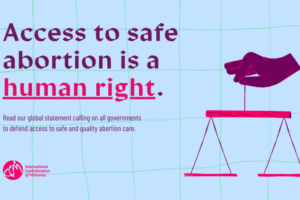
The ruling has sparked discussions on the need for Malawi to reform its restrictive abortion laws and revise national guidelines on post-abortion care, since thousands of girls and women still access illegal and unsafe abortions.
Currently, abortion is punishable by up to 14 years’ imprisonment in Malawi, with limited exceptions and while the High Court’s ruling on access to safe abortion for minors of sexual violence is a significant step forward, it has left adult survivors of rape without similar protection.
However, according to Religious Leaders Network for Choice’s Legal Counsel, Mateyu Sisya, Justice Tembo’s ruling was based on the specific case brought before it, which directed the health authorities to amend the Post-Abortion Care Guidelines within 180 days.
Mateyu emphasised that the ruling only applies to minors and that adult survivors of sexual violence can seek legal help to address the gap in their own protection to access to safe and legal abortion services — regardless of age.
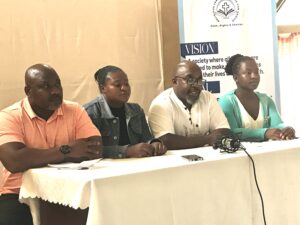
Legal Counsel Mateyu (right) and Rev. Nyekanyeka flanked by youth representatives Temwanani Banda and Takondwa Biyazawo
The Choice Network thus calls upon the Attorney General to advise the Executive arm of the Malawi government as well as Parliament, in order to make necessary policy arrangements to ensure that the October 28 ruling is enforced.
“We would like to further call upon the public to desist from making statements that are aimed at demeaning the ruling because we understand that the ruling emanated from sufficient evidence which was provided in court by all parties involved.
“We would like to call upon the public to further desist from undermining the integrity of the High Court Judge and the independence of the Judiciary — because we believe that the ruling is not barely a statement of the Judge’s personal conviction on the matter, but a thorough and objective interpretation of the Gender Equality Act of Malawi which is a product of thorough national wide consultation.
“We would like to reiterate that Section 9 of the Malawi Constitution provides for the independence of the Judiciary,” says the Network — quoting the section that says; ‘The Judiciary shall have the responsibility of interpreting, protecting and enforcing this Constitution and all laws and in accordance with this Constitution in an independent and impartial manner with regard to only legally relevant facts and prescriptions of law’.
“It is therefore our view and conclusion that in determining the case at hand the judge clearly followed what is required of him by the law as is provided in Section 9 of the Constitution. Cases are decided with regard to legally relevant facts and prescriptions of law.

Advertisement
“The judge, in our view correctly decided the case according to the prescriptions of law and legally relevant facts. The religious Leaders Network for Choice understands that all religious denominations prohibit abortion on demand based on the fact that life is sacred, and that others equate pregnancy termination to killing.
“However, we also know that all religious denominations accept that an abortion can be acceptable when it is procured to save the life of the pregnant woman whose life is endangered due to continuation of the pregnancy such as the life of the minor in question whose life was in danger of a mental health breakdown.
“We also know that some religious-owned health facilities and even health workers have freedom to exercise ‘Conscientious’ objection. We are referring to situations where medical providers refuse to provide a legal and medically appropriate treatment due to deeply held personal, moral, or religious beliefs.
“Health workers who cannot provide abortion services should refer patients to their peers who can provide such services instead of just neglecting women and girls seeking such services because medical ethics require to balance the issue of a medical provider’s right to act according to their conscience with the patient’s right to receive care and avoid unfair treatment.”
According to the ruling, the girl child who becomes pregnant as a result of sexual offences, automatically qualify for access to safe abortion in line with Section 19 of the Gender Equality Act and he asserted that the 14-year-old in this specific case was no exception because at the material time, she was automatically entitled to an abortion as a victim of a sexual offence.
This was in exercise of her right to access sexual and reproductive health rights under section 19 (1) (a) and 19 (2) of the Gender Equality Act, which the Judge observed that it was enacted specifically to safeguard the sexual and reproductive health rights of individuals.



Advertisement
